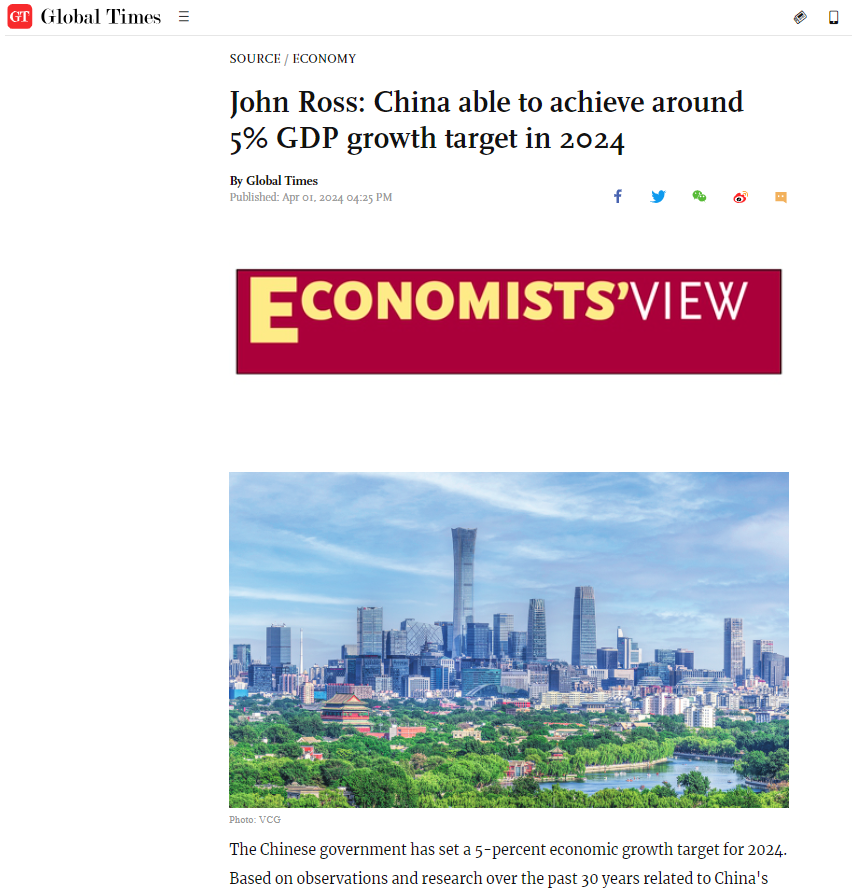LATEST INSIGHTS
Your Present Location: LATEST INSIGHTSJohn Ross: China able to achieve around 5% GDP growth target in 2024
Source: GT Published: 2024-04-01

The Chinese government has set a 5-percent economic growth target for 2024. Based on observations and research over the past 30 years related to China's economy, there is no reason why China cannot meet its 2024 GDP growth target, and undoubtedly, the country will remain the main driver of world economic growth as it has for the past 40 years.
China's investment ranks second globally in terms of efficiency of investment among the world's 20 largest economies, and is much more efficient than that of the US, despite previous assertions regarding the country's low investment efficiency. It's calculated that China's economy grows by 1 percent with investment of 8 percent of GDP, in stark contrast to the US, where 10-percent of GDP would need to be invested for the same GDP growth rate. This means that China's economic growth rate will largely exceed the US and the EU in 2024, based on last year's data, and China will remain the main driver of world economic growth.
China aims to double the size of its economy, as well as per capita income, by 2035. In that case, the country's economy needs a 4.7-percent-year growth rate each year. So far, every year's economic growth has been above 4.7 percent. The fundamental situation is that China is steadfastly pursuing high-quality development, marching toward its economic target set for 2035.
Over the past years, some Western governments and media have voiced pessimism regarding China's economic trajectory, implying that China's economic growth has reached its peak. However, based on more than 30 years of observations and research on China's economy, it's obvious that their rhetoric is absolutely falsification.
Over recent decades, we have never seen so much falsification in the Western media. According to official economic data from last year, China's economy grew 5.2 percent, while the US grew 2.5 percent, and the European economies grew around 1 percent, showing that China's economic performance was much more robust compared with other major economies in the world.
Western media should aim to find out the truth instead of repeating falsifications. The Western reports of talking down on China's economy are dangerous propaganda, and even more dangerous for them to believe such propaganda.
China has maintained an annual population growth rate of around 1 percent since 1978 while sustaining an average of 8 percent economic growth during the same period. This indicates that China's economic advancements are not solely dependent on labor force expansion but are rather driven by the overall development of its economy and efficiency improvement. It is therefore crucial to base assessments on facts rather than simply accepting Western media narratives.
The Chinese government is increasing great efforts to cultivate new quality productive forces, signifying that the country is progressing in the correct development trajectory. In general, the high-tech sectors of the world economy are going to grow even faster than average.
China's advancement in high-tech sectors has been remarkable over recent years, even under the unjustified clampdown from the US.
Taking telecommunications as an example, China already has the world-leading telecommunications companies. Sanctions on China's high-tech giants such as Huawei and ZTE from Western countries show these countries' weakness in technological competition. If the US high-tech companies could compete with confidence and strength, sanctions wouldn't be necessary.
Particularly in the burgeoning electric vehicle sector, which is expected to replace the entire combustion and diesel-driven economy over the next 20 years, China has achieved a leading position in related fields to serve as the basis of the country's economic development and optimization, not merely for the next 5 years but also the next 20 or 30 years.
The article is based on an interview with John Ross, a senior fellow at the Chongyang Institute for Financial Studies.
Key Words: John Ross, GDP, the US, Western media























































































 京公网安备 11010802037854号
京公网安备 11010802037854号





